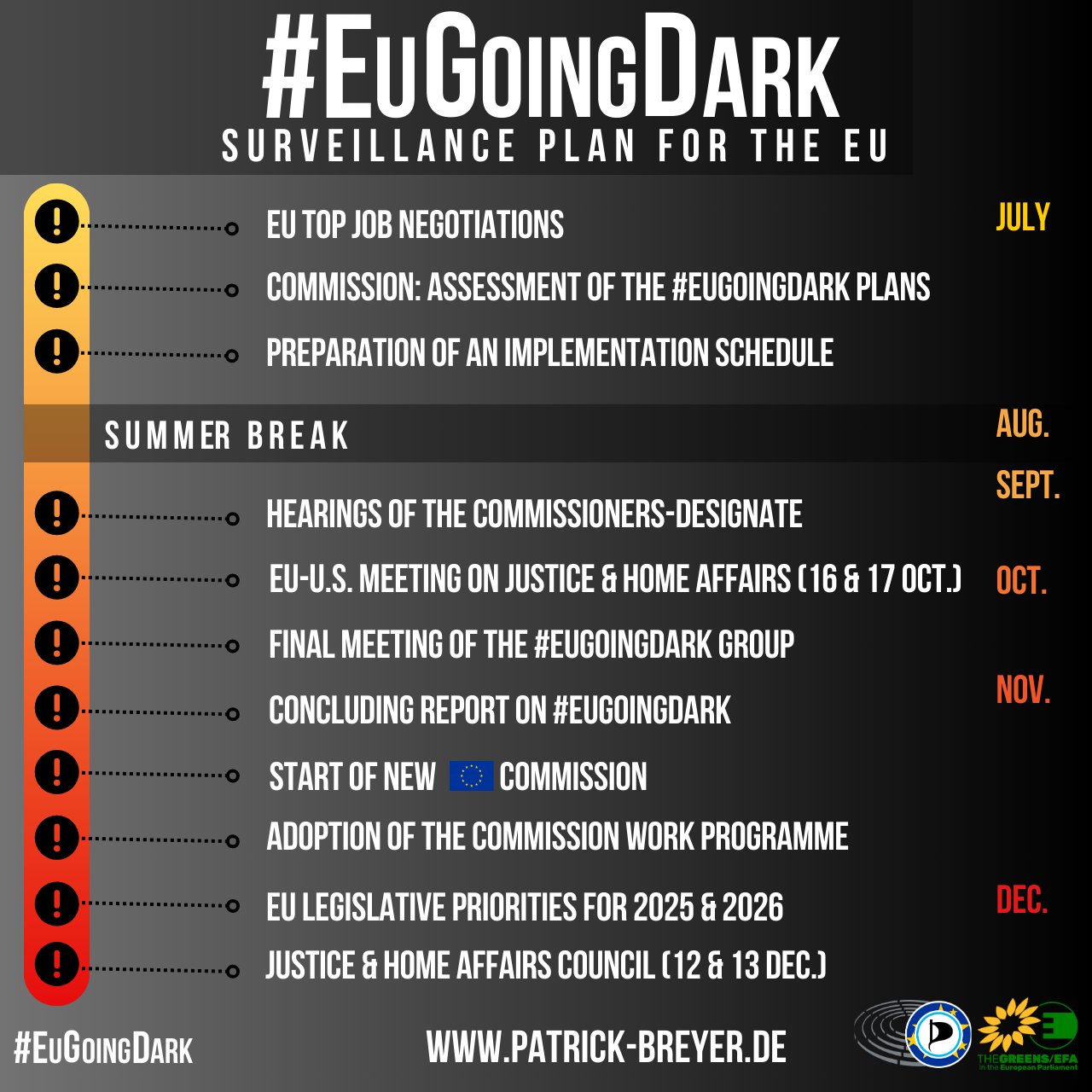#PiratesWork in Europe – Our Track Record
Foreword by Patrick Breyer
We Pirates have been passionately fighting for your freedoms and your rights in the age of the digital revolution in the EU Parliament for over 10 years. MEPs from other parties often feel committed to other priorities instead of these. We are digital freedom fighters, your voice for privacy and the free internet, the parliamentary arm of the internet community and civil society in Brussels.
As Pirate MEPs, we are persistent. I consider it an honour when the press describes me as a “pain in the neck for the European Commission and the EU Council” in the fight for our privacy (according to Politico on 26 April 2024).
We Pirates are always uncomfortable in traditional politics because we are not interested in the power struggle or posts: we keep a close eye on the powerful. When decisions are made in Brussels about chat control, internet censorship, health data, or other digital issues, we fight for your rights at the negotiating table, expose, convince, and build up pressure on decision-makers.
I am proud when I look at this track record because I would have never expected four MEPs from a small party to achieve so much in Brussels when I was elected five years ago. But you can make up your own mind about this.
We Pirates are not angry citizens, but courageous citizens – in the spirit of Mahatma Gandhi: “Be the change you wish to see in the world!”
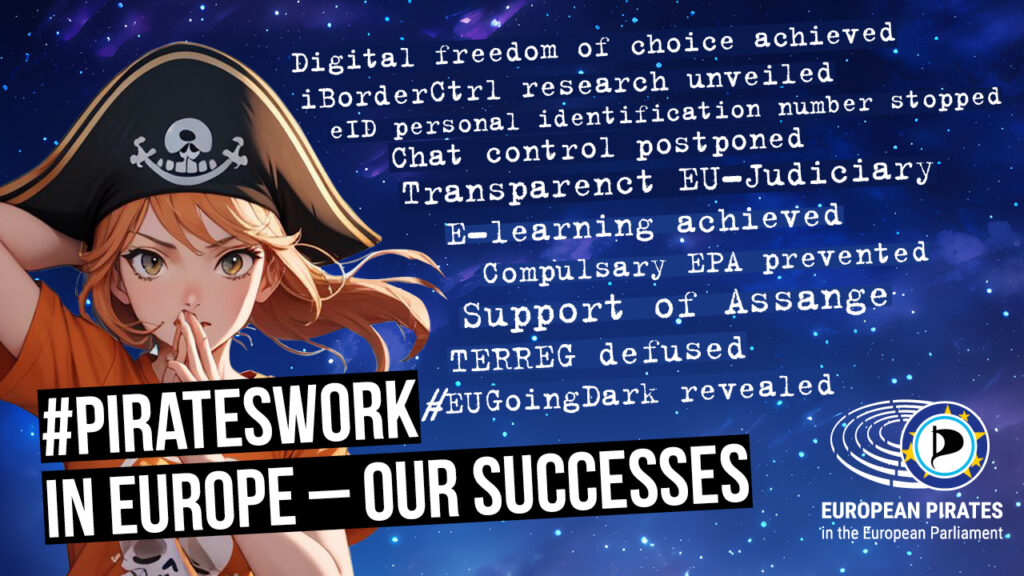
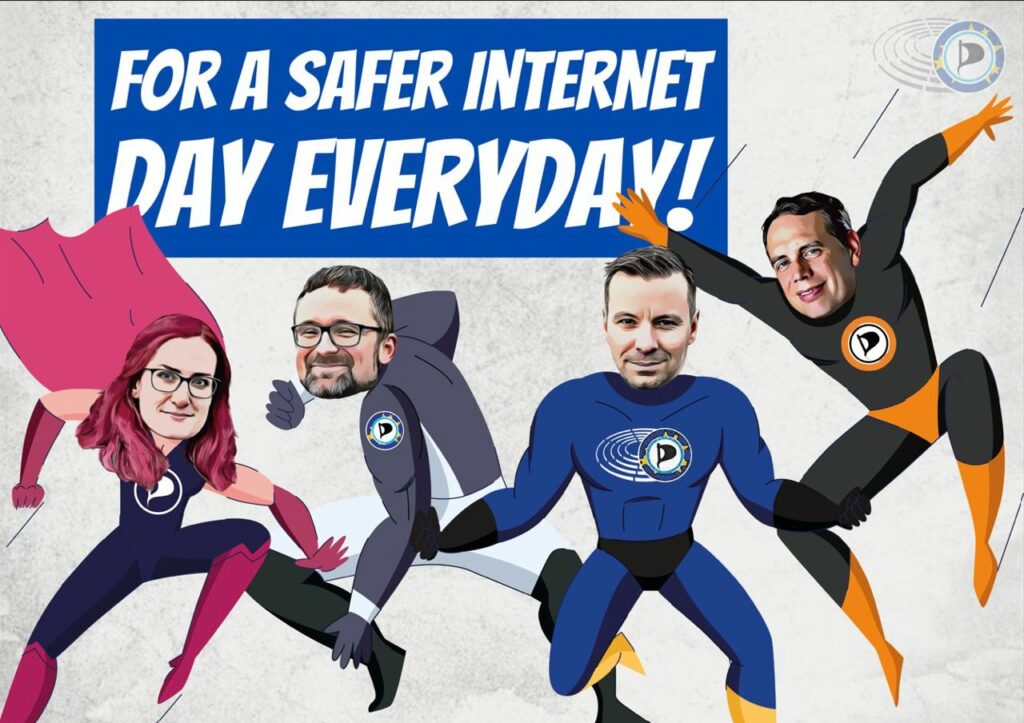
2014-2019: Pirates lead mass protests against internet censorship (Article 13)

Our first MEP in Brussels (2014-2019) was Felix Reda – Europe’s internet expert par excellence. Thanks to him, the Europe-wide resistance to the restriction of freedom of expression online through upload filters and link taxes was so strong that hundreds of thousands took it to the streets (#SaveYourInternet).

That’s what we achieved for you back then in the European Parliament:
- 1 million euros to promote the security of free software
- Photography of landscapes remains permitted (freedom of panorama)
- Development and use of software for publishing lobbyist contacts
- Cross-border use of video services and internet shops facilitated (geo-blocking restricted)
- Digital citizen participation in the drafting of the report on copyright reform
- Publication of a secret study according to which file sharing hardly reduces the profits of the entertainment industry
- Europe-wide resistance to internet censorship through “upload filters” and “link tax”
Pirates fight for freedom of choice, digitalisation, and transparency
Please click on a heading to read the text:
1. Standing up to Big Tech: More freedom of choice and diversity online
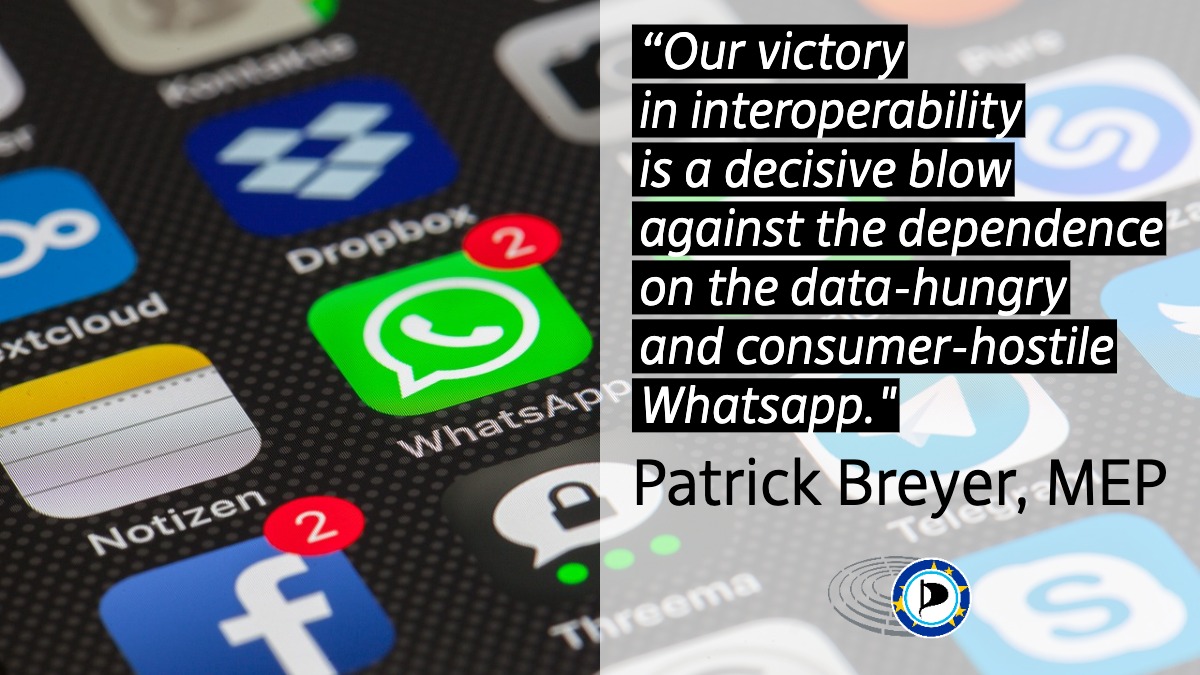
The internet is dominated by large tech companies such as Google, Apple, and Meta, and there is hardly any way around their offerings. This dominance and indispensability invites abuse. With the Digital Markets Act (DMA), Europe is standing up to the internet companies. As Pirate MEPs, Marcel Kolaja from the Czech Republic and Patrick Breyer from Germany were involved in the legislative negotiations.
The result: The cross-platform monitoring of your internet usage by Big Tech is now prohibited. When you search for products, Google must now show you better offers than just from its advertisers. Apple must also allow apps from platforms and internet browsers other than Safari on its iPhones. A particular success, which has only been included in the law thanks to us Pirates, is cross-messenger communication (so-called interoperability).
“Until now, many of us have been unable to avoid using the messenger top dog Whatsapp to reach our friends and follow important Whatsapp groups. However, Whatsapp has repeatedly displayed anti-consumer conditions and practices. Thanks to the new law, Whatsapp users and groups will also be reachable via other messenger services if the services and users agree to this. Of course, cross-service communication is completely voluntary and dependent on the user’s consent. It has the potential to break our dependence on WhatsApp, create real freedom of choice and initiate competition for the best messenger. This will also give privacy-friendly and non-commercial messengers, which themselves have few users, a chance – as a better gateway to WhatsApp.”
Dr. Patrick Breyer, MEP of the Pirate Party
2. The European Court of Justice is becoming more transparent than ever
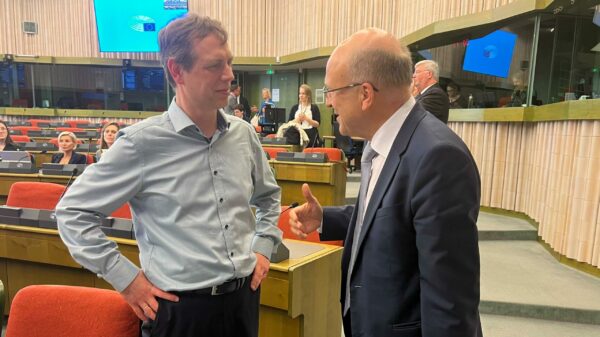
On the initiative and under pressure from Pirate Party MEP Dr. Patrick Breyer, who is himself a judge by profession, the European Court of Justice is becoming more transparent than any other court: in the future, when a question has been referred to the ECJ for a ruling, the Court will proactively and systematically publish the letters and arguments submitted on its website after the judgement has been delivered. An exception applies if the author of a pleading objects, but in this case, there is a right of access to information via the EU Commission upon request. As co-negotiator of the reform of the ECJ statute, Breyer has pushed through the new transparency of European justice.
“After landmark judgements with far-reaching consequences, the public has a right to know and discuss the positions our governments and institutions advocated for. I am sure we will be surprised by some of the positions our own governments take. In a democracy where freedom of the press reigns, it must be possible to hold the powerful accountable for their behaviour in court. At a time when the EU and its Court of Justice are facing a crisis of confidence, transparency creates trust. It is a privilege that, as a Pirate Party MEP, I was able to introduce our core concern of a transparent state into the negotiations and successfully push it through.”
Dr. Patrick Breyer, MEP of the Pirate Party
3. Breaking the EU’s silence on Wikileaks founder Julian Assange
The prosecution of Wikileaks founder Julian Assange for researching and publishing war crimes committed by the USA is attracting worldwide attention and protest. Transparency must not be a crime! That is why the EU Pirate MEPs have nominated Julian Assange for the Nobel Peace Prize. When his imminent extradition was threatened in early 2024 and the EU Commission remained silent, we Pirates pushed through a debate in the European Parliament in which the EU Commission had to break its silence and make a statement. Pirate MEP Dr Patrick Breyer also initiated two letters from MEPs to the British Home Secretary. In this context, he met with Julian Assange’s wife several times to coordinate support. In mid-May 2024, Assange’s appeal was allowed and his extradition averted for the time being.
“The prosecution of the Wikileaks founder for exposing war crimes deeply shocks our sense of justice and sets a devastating precedent for investigative journalism around the world. Transparency must not be a crime!”
Dr. Patrick Breyer, MEP for the Pirate Party
4. Strengthening digital learning and free knowledge
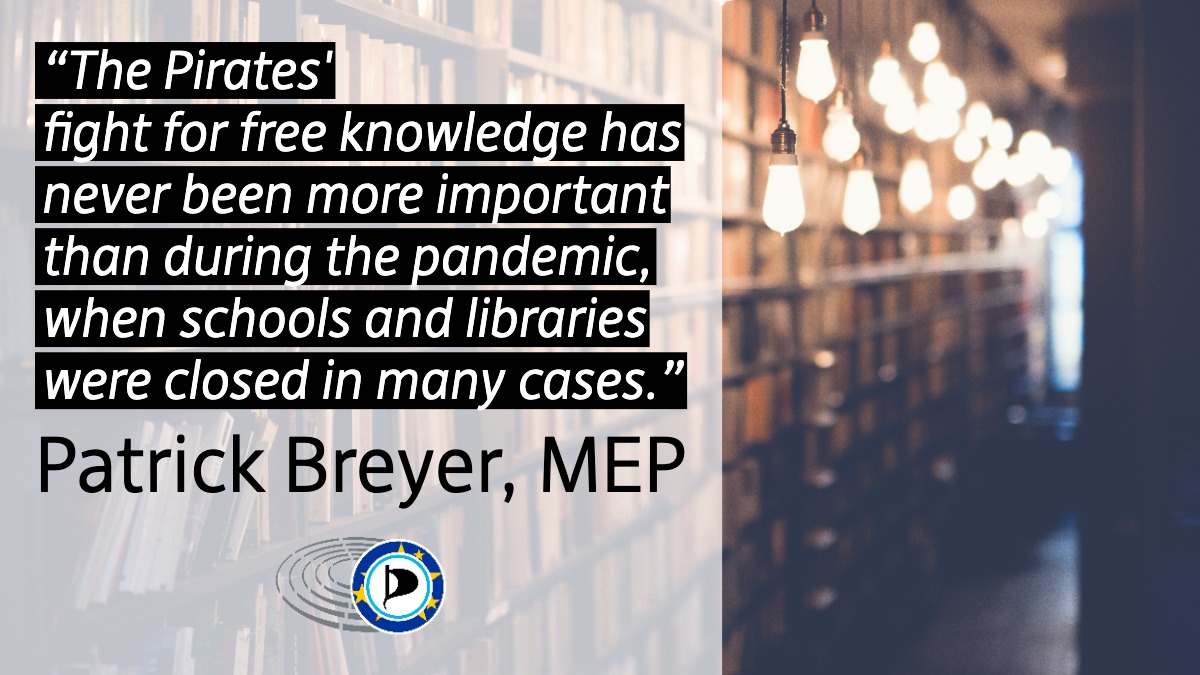
In the digital age, it should go without saying that libraries should also lend books, CDs etc. digitally, but copyright law stands in the way. At the suggestion of Pirate Party MEP Dr. Patrick Breyer, the EU is funding a study into how distance learning and research can be facilitated by adapting copyright law. Also at Breyer’s suggestion, the feasibility of a “public EU directory of works in the public domain and under free licences” is being examined. Such a directory could strengthen access to copyright-free knowledge.
“The Pirate‘s fight for free knowledge has never been as important as during the pandemic, when schools and libraries often were closed. We finally need legal certainty. Business interests must no longer stand in the way of digital learning and research. The pilot projects I have proposed are an important first step in bringing the laws into line with the needs of our digital knowledge society.”
Dr. Patrick Breyer, MEP for the Pirate Party
Pirates prevent chat control, obligatory ePA, and upload filters
Please click on a heading to read the text:
1. Digital privacy of correspondence and secure encryption: chat control stopped

With a globally unique draft law presented in 2022, the EU Commission wants to make it compulsory for chat and messenger providers to search private chats, messages, and emails for suspicious content on a massive scale, without cause, and indiscriminately. The reason: prosecution of child pornography. The consequence: unprecedented mass surveillance through fully automated real-time chat monitoring and thus the abolition of digital privacy of correspondence. Even secure end-to-end encryption is to be overridden for the first time. Age controls are intended to make anonymous communication impossible; a minimum age of 16 for apps would mean digital house arrest for young people.
“We Pirates invented the concept of chat control and talked about the dangers for years until a broad resistance emerged far beyond the online movement. Our private photos and intimate chats have no place in the hands of foreign moderators and government employees and are not safe there. Law enforcement officers complain of being overworked, criminologists warn of the criminalisation of young people, the Child Protection Association and victims of abuse criticise the destruction of safe spaces.
As a co-negotiator of the draft law on chat control, together with civil society, I succeeded in convincing MEPs across all parties and across Europe that we need a different approach to protecting children online: proactive searches of the open internet, deletion obligations for providers and law enforcement officers, but above all a more secure design of internet services that prevents unwanted contact between sex offenders and children from the outset (security by design). Mass surveillance of chats, the destruction of secure encryption and anonymous communication, digital house arrest – the EU Parliament has rejected all of this in response to our pressure.”
Dr. Patrick Breyer, MEP for the Pirate Party
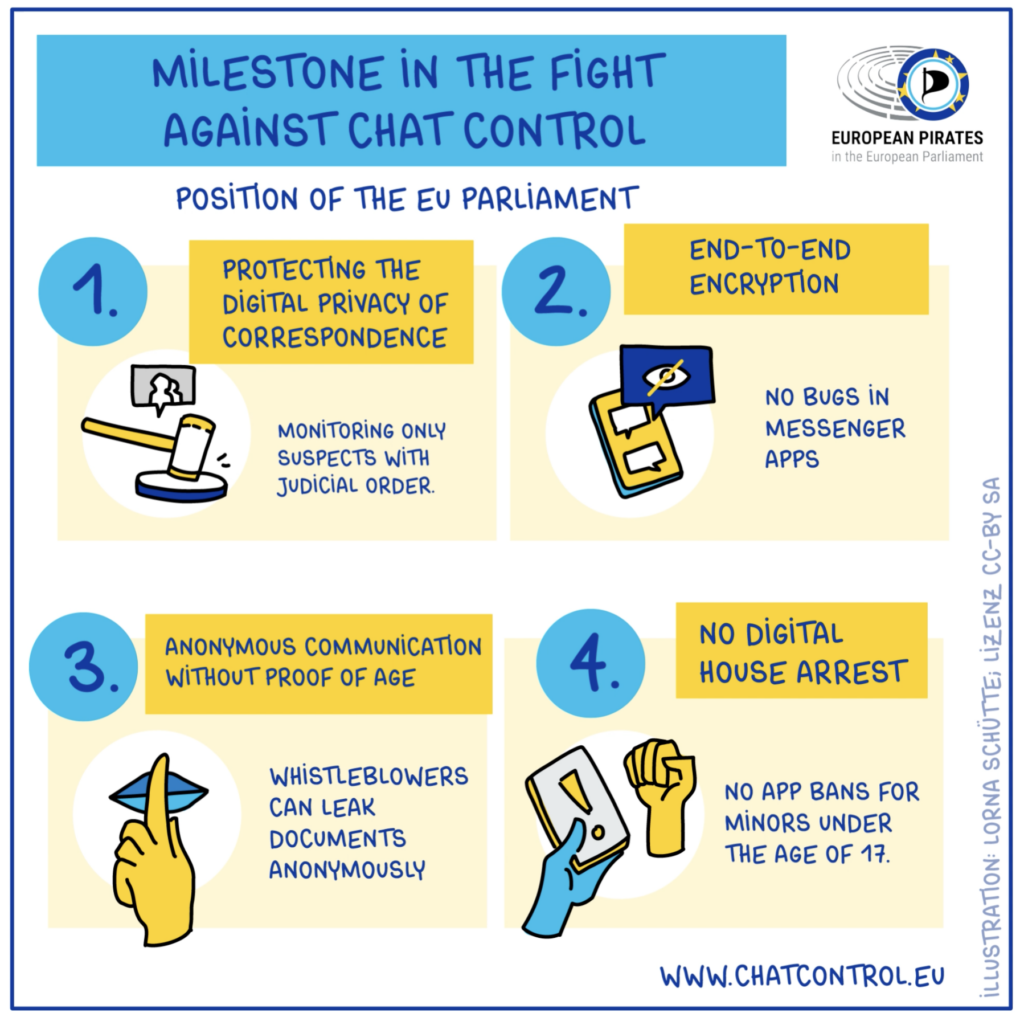

However, this does not mean that chat control is off the table: the majority of EU governments (EU Council), as the second legislator, are sticking to the original Big Brother proposal on chat control. So far, critical EU governments have blocked this, but are to be persuaded to give in by making minimal concessions. We Pirates report regularly on the status of negotiations (chatcontrol.de). If chat control wins thought in the EU Council, the Parliament is in danger of falling over in compromise negotiations (trilogue). The European elections will decide whether we Pirates will continue to sit at the negotiating table and be able to defend the digital privacy of correspondence.
In the course of the “chat control gate” scandal, it also emerged that an international lobby network of technology companies and law enforcement agencies was closely involved in the development of the extreme draft law on chat control. Following a complaint from us Pirates, the EU Ombudsman is currently investigating whether Europol employees were allowed to switch directly to US technology companies that sell chat control algorithms. Pirate MEP Dr Patrick Breyer has also filed a lawsuit against voluntary chat control on the Facebook platform. The parent company Meta (Facebook, Instagram Whatsapp) has since announced its intention to introduce secure chat encryption and abandon the screening of private chats.
Read more: www.chatcontrol.de
2. The electronic patient file remains voluntary
We are all getting an electronic patient file in which every treatment is to be recorded. The EU has decided that the patient file will also be available for private patients and will be accessible throughout Europe in the future. If we receive treatment abroad, doctors will be able to access our medical history. And, access to our data is supposed to improve medical research. But what about medical confidentiality and our right to self-determination as patients, especially in the case of sexually transmitted diseases and sexual disorders, impotence and infertility, abortions, addictions, or mental illnesses? Will those who fear that their intimate problems will become public still be treated? Pirate MEP Dr Patrick Breyer sat at the negotiating table during the negotiations to create the “European Health Data Space” and repeatedly called for patients to have control over their data.
“Thanks to our work, the EU Commission’s original plans for a remotely retrievable, networked electronic patient file containing all of our treatments will not materialise. We saved the German right to object to an electronic patient file with the help of an amendment that received a broad majority in Parliament. Anyone who objects to the electronic patient file can therefore rest assured that the treatment information will only be stored by the treating doctor. In this way, we can protect ourselves from the risk of hacks and losses of highly sensitive treatment data.”
Dr. Patrick Breyer, MEP of the Pirate Party
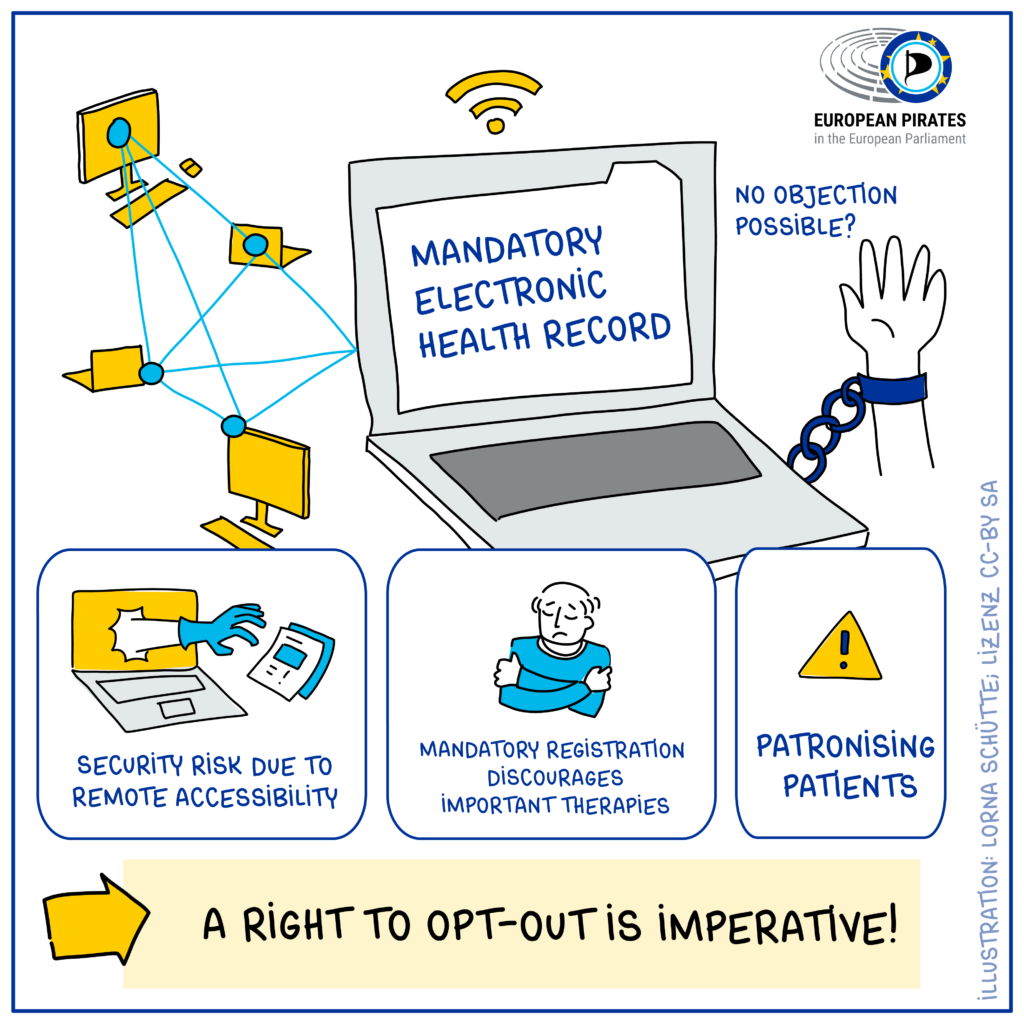
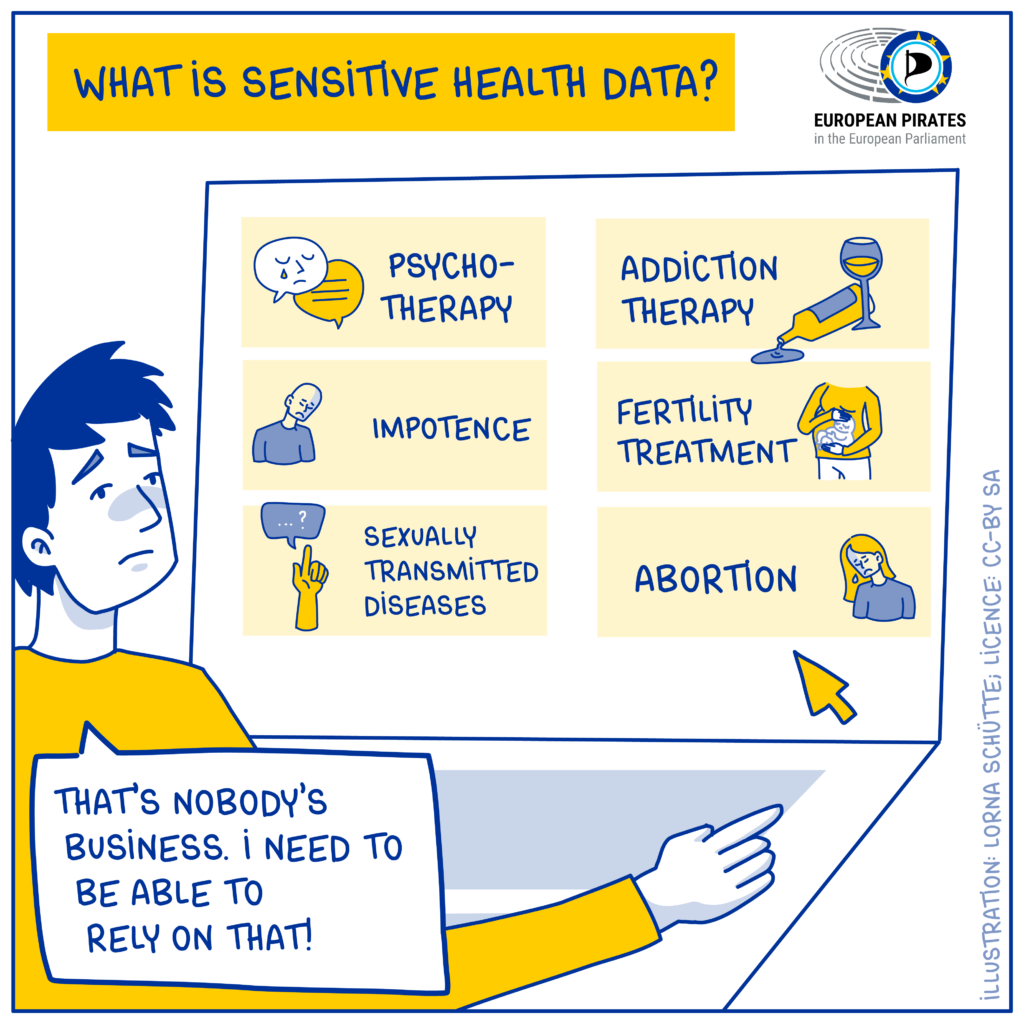
3. Digital Identity: we are not a number
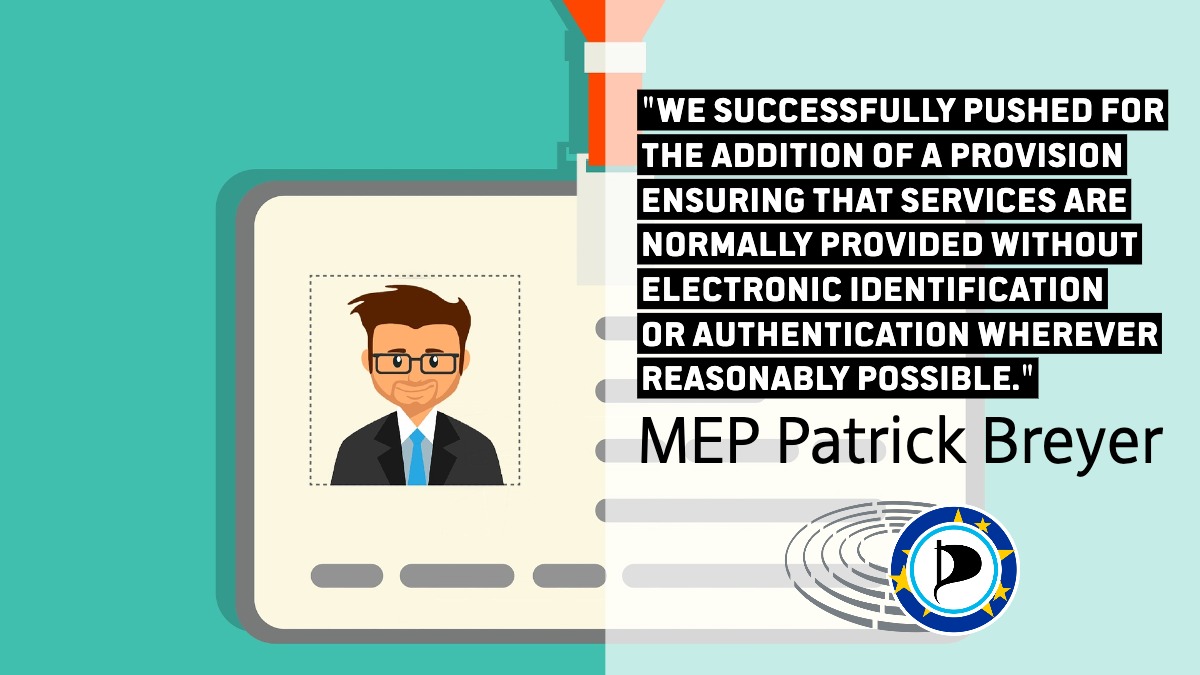
A new digital identity app is supposed to enable EU citizens to access public and private digital services such as Facebook or Google and pay online in the future. As Pirate MEPs, Mikulas Peksa from the Czech Republic and Patrick Breyer from Germany were involved in the legislative negotiations. The result is not satisfactory, but we Pirates have achieved major partial successes:
- We ensured that Member States will not be obliged to assign a lifetime personal identification number to every citizen. This would have made it possible to combine our internet use in very different areas into a comprehensive profile.
- The use of the eID app will be voluntary and it will still be possible to access public and private services with other existing means of identification and authentication.
- The code of the app client will be publicly accessible and therefore verifiable (open source).
“We have successfully prevented the assignment of a unique, lifelong personal identification number that could have been used to comprehensively record and monitor our digital lives. And the ‘digital identity’ remains voluntary. Now it’s all about implementation.”
Dr. Patrick Breyer, MEP of the Pirate Party
4. Exposing terrorism instead of radicalising it

In the negotiations on a regulation to “combat the dissemination of terrorist content online” (TERREG Regulation), Pirate MEP Dr. Patrick Breyer has campaigned to protect the freedom of expression on the internet to fight censorship. He was supported by over 60 organisations, including journalists, human rights, and data protection associations. He was able to push through important safeguards in the negotiations:
- Content disseminated for educational, artistic, journalistic, or research purposes or to raise awareness of terrorist activities, as well as content that expresses polemical or controversial views in the context of a public debate, is exempt from deletion.
- Penalties for small or private providers unable to comply with deletion orders within one hour are excluded.
- The mandatory use of error-prone upload filters is expressly excluded. Upload filters are censorship algorithms that cannot reliably distinguish terrorist propaganda from the legitimate use of images/videos.
“Ultra-rapid, cross-border deletion orders without a judge’s reservation threaten freedom of opinion and freedom of the press online. Censorship of open platforms can quickly push terrorist propaganda into direct channels and thus further radicalise subscribers. Anti-terror laws are repeatedly used for completely different purposes, for example against the Catalan independence movement and Spanish musicians, against social protests in France, against climate protectors or immigrants. I worked hard in the negotiations of the TERREG regulation to defend the fundamental right to freedom of expression – with considerable success.”
Dr. Patrick Breyer, MEP of the Pirate Party
Pirates reveal and sound the alarm on EU surveillance research and plans
Please click on a heading to read the text:
1. EU video lie detector research unveiled
Unfortunately, the EU continues to fund the development of dystopian technologies for the mass surveillance and control of the population, even if their use would be unethical and contrary to fundamental rights. It has tested unscientific technology at border crossings that claims that it can determine whether a person is telling the truth or lying based on their facial expressions. The EU kept many of the documents produced about the “iBorderCtrl” project secret to protect the commercial interests of the companies involved.
Patrick Breyer’s complaint to the European Court of Justice against this secrecy was partially successful: the EU Commission had to issue a critical ethics report and a critical legal opinion, among other things. As a result of public criticism, the video lie detector is still not in use today.
“In the course of my transparency complaint, it emerged that those responsible for the project had misappropriated the research funds in order to lobby for a change in the law that would make the use of the ‘video lie detector’ possible. Systems for detecting conspicuous behaviour gradually create a uniform society of passive people who just don’t want to attract attention. Such a dead surveillance society is not worth living in. I am convinced that this pseudo-scientific security mumbo-jumbo will not find terrorists. For stressed, nervous, conspicuously dressed or tired people, such a suspicion machine can quickly become a nightmare. The development of technologies for the ever-increasing surveillance, recording and control of people must stop!”
Dr. Patrick Breyer, MEP of the Pirate Party
2. Shedding light into the darkness of the “Going Dark” surveillance forge
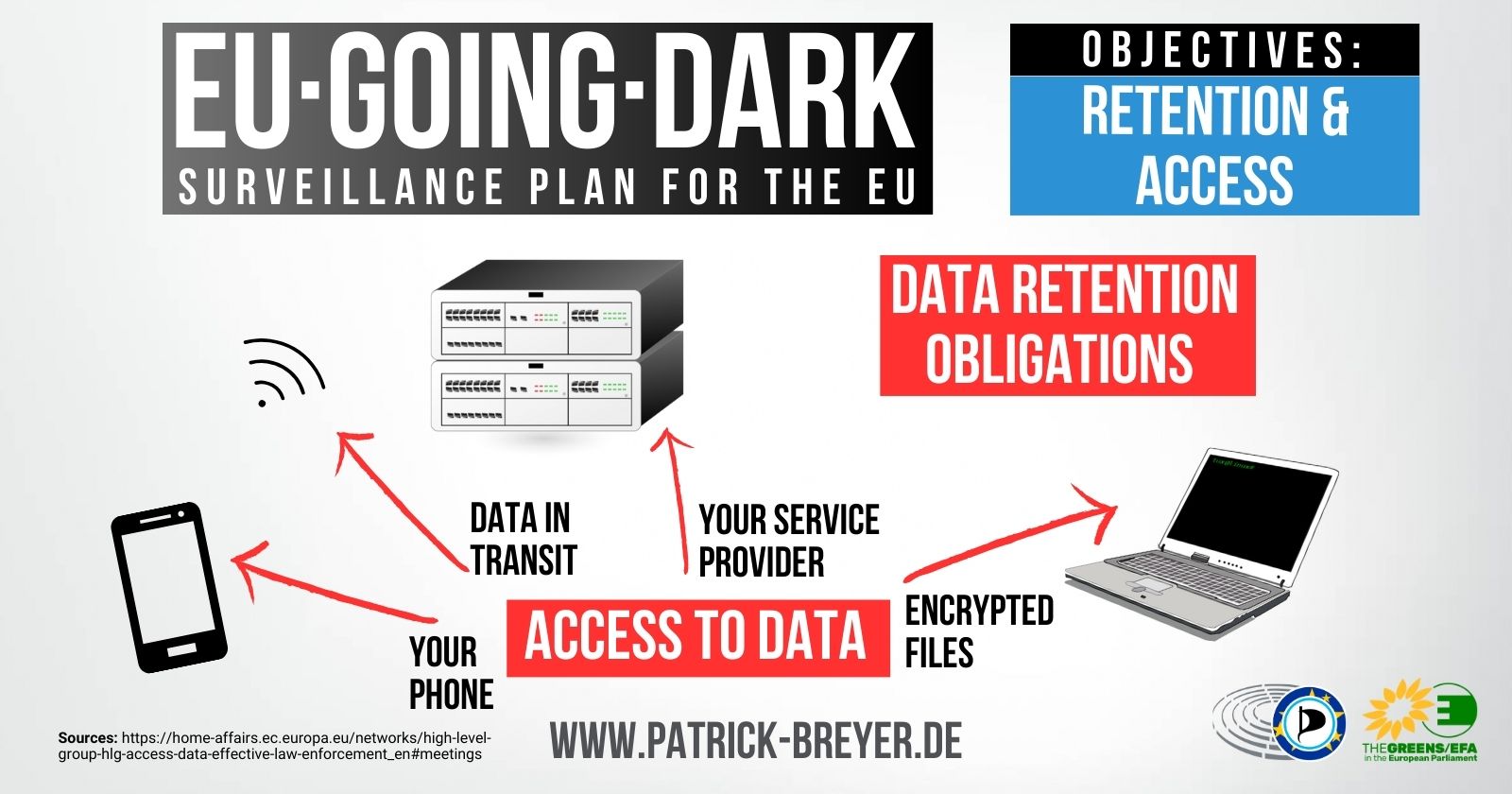
In secret, a one-sided EU “group of experts” is working on breaking secure encryption (“security by design”) and reintroducing the Europe-wide retention of our contacts, movements (locations), and internet connections without suspicion. This is to be implemented after the European elections. We Pirates have brought the plans of this surveillance hotbed to public attention. Our pressure led to the hand-picked group having to listen to and involve critical civil society and data protection organisations.
We Pirates have been following and supporting the Europe-wide fight against data retention with our own campaigner for years. With a surveillance map, for example, we have proven that the supposedly “targeted data retention” in Belgium actually has a nationwide effect. Our work has also prevented a new edition of the EU Data Retention Directive, which was overturned by the ECJ.
“Expose and build pressure – this is how we Pirates in Brussels are defending our fundamental right to private, secure and free communication against the #EUGoingDark surveillance factory. Because we know how quickly these secret plans will reappear in the official work programme of the next EU Commission, it is crucial to ensure that the public is informed very early on and persistently to organise resistance.”
Dr. Patrick Breyer, MEP of the Pirate Party
3. Financial paternalism and high-tech surveillance state? Pirates sound the alarm!
When EU plans threaten our fundamental rights in the digital age, we pirates sound the alarm and ensure transparency. We explain why the ban on anonymous crypto payments jeopardises the funding of government critics, why the design of the planned digital euro will lead to unprecedented financial paternalism, and why the EU cap on cash payments threatens our financial freedom. We Pirates explain why biometric real-time facial surveillance leads to constant false suspicions and how AI-supported behavioural surveillance of public spaces creates pressure to conform.
“Today’s technology enables a high-tech surveillance state, and China is already building it. We Pirates are sounding the alarm when we see steps in this direction in Europe too. We say no to a life under constant surveillance and a culture of fear. Yes to our right to freedom and privacy, to diversity, to our right to seek our own happiness. A future in freedom is worth fighting for!”
Dr. Patrick Breyer, MEP of the Pirate Party
4. By their votes you shall know them
Paper is patient. Politicians speak differently than they act. And the media often tells us little about what the EU decides and who is responsible for it. That’s why we Pirates create and publish voting charts that clearly show which parties and MEPs voted and how. Our Pirat-o-mat shows all voting graphics and compares your positions with real votes in the EU Parliament. This feature is unfortunately only available in German.
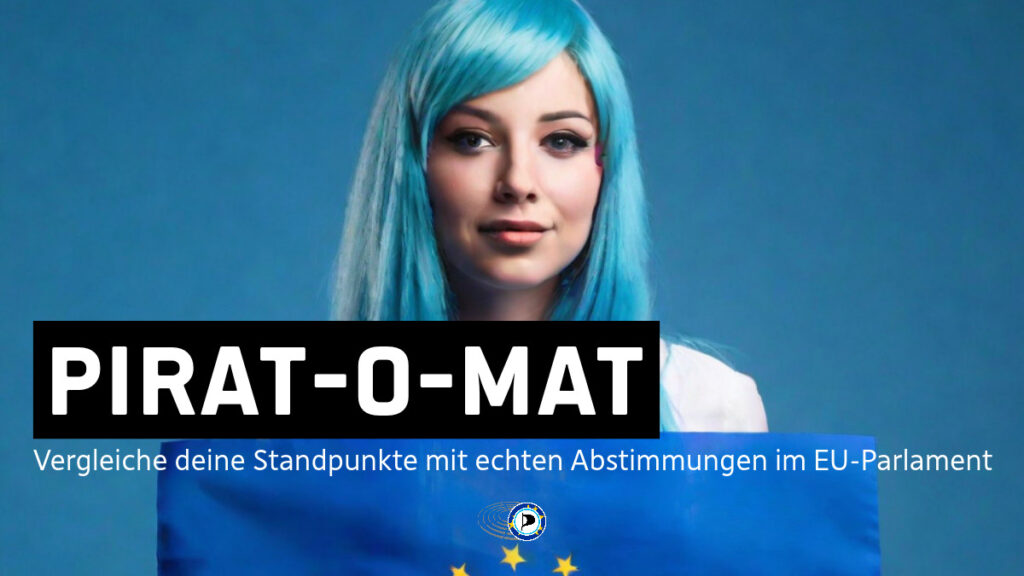
“As an ordinary citizen, you generally don’t know who votes how in Brussels and whether the voting behaviour lives up to a party’s promises. Because the EU Parliament makes its voting records as incomprehensible as possible, our voting charts ensure transparency. The Pirat-o-mat will surprise many users, annoy some and hopefully lead to further questions and discussions. Our democracy thrives on transparency, participation, credibility and accountability – the Pirat-o-mat is our contribution to this.”
Dr. Patrick Breyer, MEP of the Pirate Party
This is what independent experts and activists say about us
“We fought together against upload filters. They would have been much more prevalent, if hundreds of thousands of people had not demonstrated against them. … The work of Patrick Breyer is much more transparent compared to other political parties. The website is informative and the office is always helpful.”

Thomas Bobinger, Federation of German Consumer Organisations
“The more expertise, the better the decisions. There was a lot of expertise among the Pirates and to some extent the Green Group, where you can also see that meaningful results emerge.”
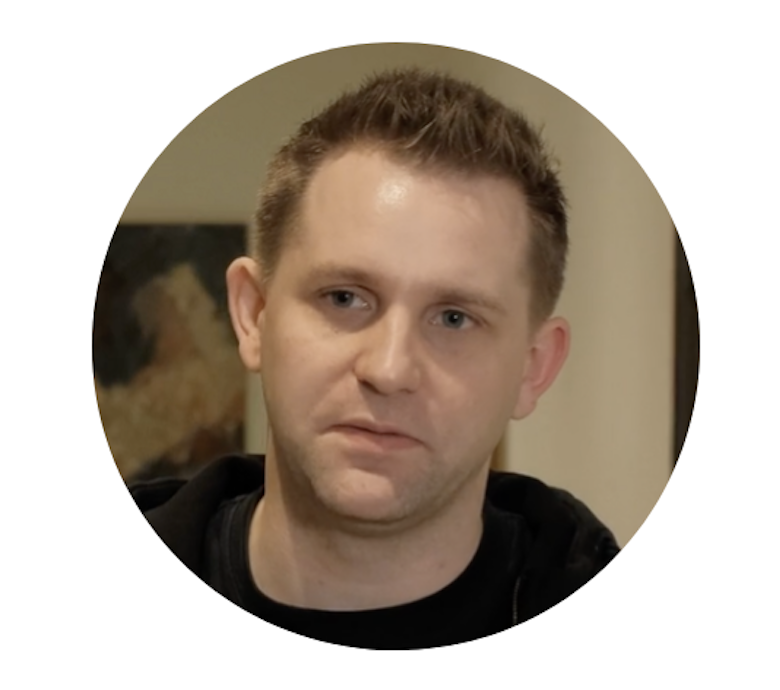
Max Schrems, Data protection activist
“It’s important that people like Patrick, who are aware of the dangers, can show that this is not how it works.”

Nella, Hacktivist
“Both Patrick and the team were always approachable and very reactive. Concrete example of chat control: we wouldn’t be where we are today”

Dorothee Wildt, German Bar Association
“The results are absolutely impressive. These are examples of ‘democracy gets things done’. People don’t just talk, they get things done.”

Rena Tangens, Digitalcourage
“That was Felix [Reda]: someone who knew how to play the parliament.Felix made sure that the parliamentary position on the rights of creative artists got through.”

Paul Keller, Open Future
“The Pirates once leaked a draft that would otherwise not have become public… Many legislative proposals would have been scrutinised differently and scandals would not have become public… The Pirate Party has done a good job of agenda setting to bring issues to the public’s attention, even with terms such as upload filters and chat control.”

Stefan Krempl, Author and journalist
In the media
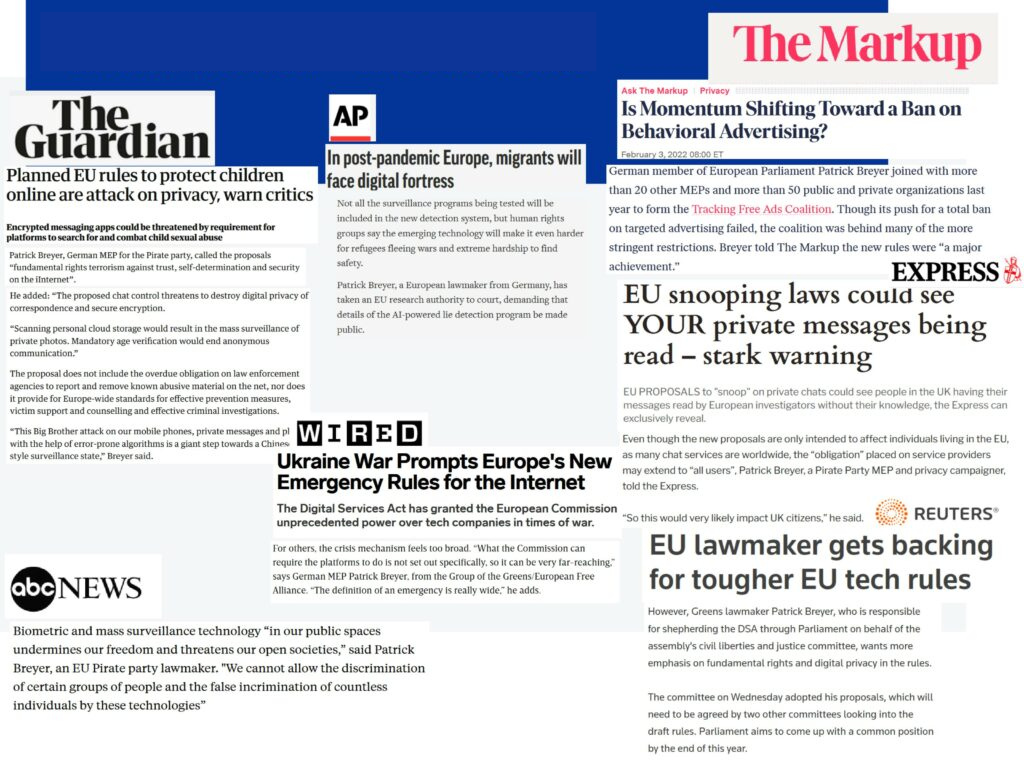
Successes of the three Czech Pirate MEPs
In the Czech Republic, we Pirates are part of the government and provide the country’s digital and foreign ministers. Three Czech Pirates are members of the European Parliament. Marcel Kolaja has been nominated by his party as the next Czech EU Commissioner. Here are some of the successes of Czech Pirate MEPs:
- Markéta Gregorová:
- Regulation on weapons and other dual-use goods: preventing the misuse of European technology by dictators against their citizens.
- Trade facilitation for Ukraine: Introduction of zero tariffs on Ukrainian products to support the Ukrainian economy
- Marcel Kolaja:
- European law on media freedom: protection against political interference in editorial decisions and monitoring of journalists, including a ban on media ownership by high-ranking politicians.
- Digital Markets Act: levelling the playing field in digital markets to reduce the dominance of tech giants
- As Quaestor of the European Parliament and member of the Bureau, Marcel has achieved greater transparency of lobbying structures and a highlighting of the lobbyists involved in each legislative proposal
- Mikulas Peksa
- Energy Performance of Buildings Directive: promoting investment in building renovation to reduce energy costs and make it accessible to all
- Renewable Energy Directive (RED II): Reducing dependence on Russian gas and increasing energy efficiency in industry
- Resolution on strengthening the rule of law in Hungary: Addressing the impact of breaches of the rule of law on the EU budget



